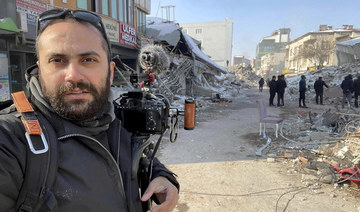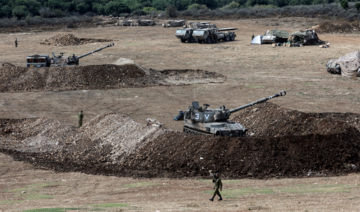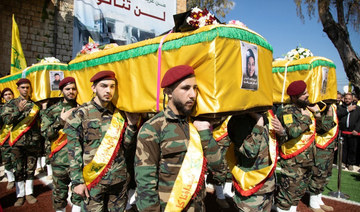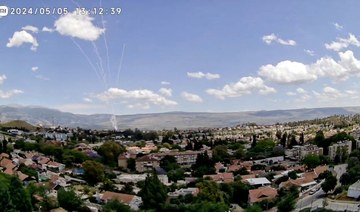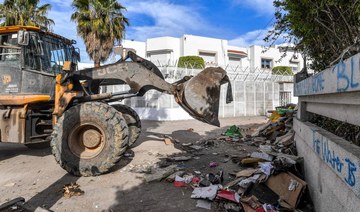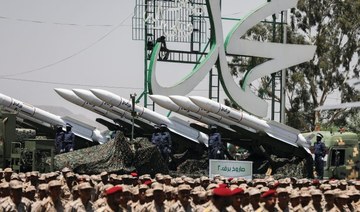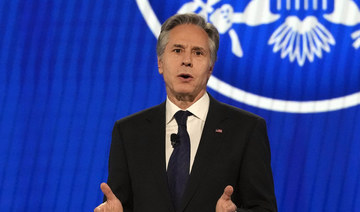BEIRUT: Caretaker Prime Minister Najib Mikati has stressed the role of the Lebanese army in “protecting security and stability,” amid the turbulence along its southern border with Israel.
His remarks followed a Cabinet meeting on Thursday night also attended by security leaders.
Mikati described the events in southern Lebanon, which has seen clashes following Hamas’s attack on Southern Israel on Oct. 7, as “concerning.”
The prime minister said he asked “those in charge to be on high alert to face any emergency and support the government’s efforts in sparing Lebanon the repercussions of what is happening and maintaining security and citizens’ safety.”
Iranian Foreign Minister Hossein Amir-Abdollahian said on Friday that Lebanon’s security and peace “is important to us,” after meeting with Mikati.
“One of the goals of our trip is to stress on Lebanon’s security,” he said.
Amir-Abdollahian arrived in Beirut on Thursday evening and held talks with Lebanese officials, including Hezbollah chief Hassan Nasrallah.
Amir-Abdollahian said: “What matters to us today is Lebanon’s security and peace. This is the goal of my visit.”
He suggested that a special meeting should be convened for the region’s leaders to study the situation.
Amir-Abdollahian said violence could spread to other parts of the Middle East if Israel’s attacks on the Gaza Strip, launched in retaliation for the Hamas attack that has left at least 1,200 Israelis dead, did not stop immediately.
Amid the continued Israeli military activity, Amir-Abdollahian said opening other fronts against the country “is possible.”
Caretaker Lebanese Interior Minister Abdallah Bou Habib clarified following his meeting with Amir-Abdollahian that Lebanon “has never wanted or sought war, and we warn that continued escalation will ignite the region and threaten its peace and security.”
Protests in solidarity with Gaza took place across Lebanon after Friday prayers.
Protesters including women and children waved the Palestinian flag and wore the Palestinian keffiyeh around their necks, while Palestinian refugees wore traditional clothes and chanted slogans denouncing Israel’s attacks on the people of the Gaza Strip.
One child held up a sign saying: “Kids like me should not be killed.”
However, solidarity demonstrations did not reach the Blue Line on Lebanon’s southern border.
The Lebanese Armed Forces set stringent security checkpoints adjacent to the Blue Line and checked the identities of all who approached.
Lebanese Army Chief Gen. Joseph Aoun informed the Cabinet on Thursday that his forces were conducting joint patrols with the UNIFIL to avoid violations.
A military source told Arab News that the situation was being controlled avoid any clash with mobilized Israeli troops on the other side of the border.
Fear prevails in many southern regions, where residents have fled their homes.
Elsewhere people took to the streets in Beirut’s working-class neighborhoods and southern suburbs and in the southern city of Tyre and its refugee camps.
They also gathered in Bekaa, praying in the street at the Masnaa border crossing between Lebanon and Syria, under the slogan “a unified Friday for a sacred cause.”
Other demonstrations took place in the northern cities of Baalbek and Tripoli.
Imams from Beirut’s mosques called some of the protests, while others were organized by Hezbollah and its ally, the Syrian Social Nationalist Party, in Beirut.
Sheikh Naim Qassem, Hezbollah’s deputy chief, said before the protesters in a southern suburb of Beirut: “Al-Aqsa Flood operation is successful by all standards.”
Qassem stressed that Hezbollah was fully aware of its responsibilities.
“We are ready, and we are following up the events minute-by-minute.
“We will confront the situation based on our vision and plan. We are watching the enemy’s movements and are ready to act whenever the time is right.”
PM Mikati highlights army role in Lebanon’s security
https://arab.news/bpr3a
PM Mikati highlights army role in Lebanon’s security
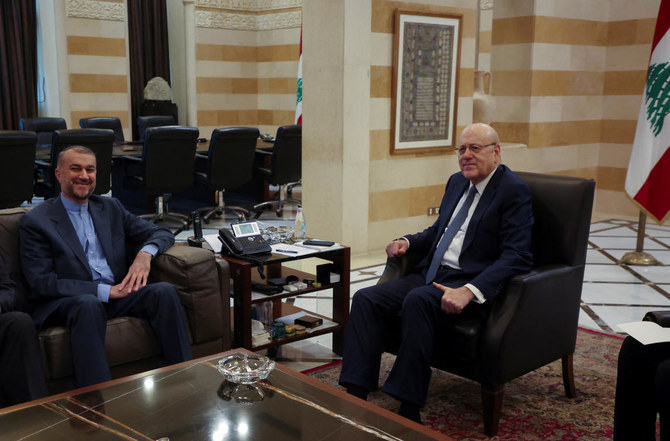
- In Beirut, Iran’s foreign minister warns war could spread if bombardment of Gaza continues
- Mikati described the events in southern Lebanon, which has seen clashes following Hamas’s attack on Southern Israel on Oct. 7, as “concerning”
80,000 Palestinians flee Rafah since Israel hiked operation this week: UN agency

RAFAH: The United Nations agency supporting Palestinian refugees said Thursday that about 80,000 people had fled Rafah in the three days since Israel intensified military operations in the south Gaza city.
“Since Israeli forces military operation intensified on 6 May, around 80,000 people have fled Rafah, seeking refuge elsewhere,” UNRWA said on X, formerly Twitter, warning that “the toll on these families is unbearable. Nowhere is safe.”
Israeli strike on Lebanon kills four Hezbollah fighters, security sources say
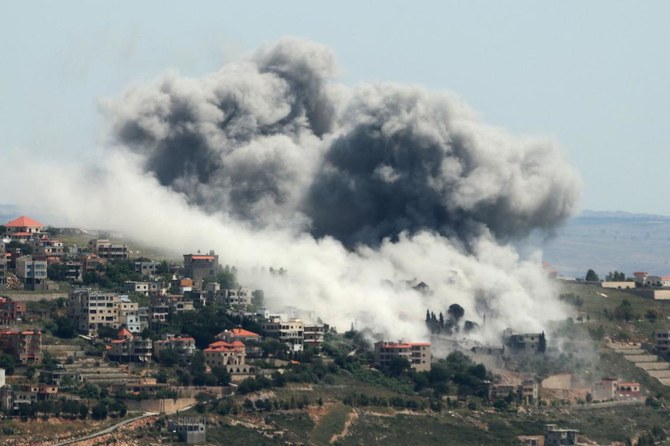
- Israeli military did not immediately comment on Thursday’s strikes
- Lebanon’s civil defense rescue force said it had pulled four bodies out of a car that had been scorched by an Israeli strike
BEIRUT: An Israeli air strike on a car in southern Lebanon killed four people on Thursday, according to Lebanon’s civil defense, with security sources saying those killed were members of armed group Hezbollah.
The conflict between Hezbollah and Israel has rumbled on since October in parallel to the Gaza war, with an escalation this week as both sides intensified their bombardment, fueling concern of a bigger war between the heavily-armed adversaries.
Israel has used artillery, drones and warplanes against targets in southern Lebanon, including to strike fighters from Hezbollah and other armed groups. Fighters in Lebanon have launched rockets and their own drones into northern Israel.
The Israeli military did not immediately reply to a request for comment on Thursday’s strikes.
Lebanon’s civil defense rescue force said it had pulled four bodies out of a car that had been scorched by an Israeli strike. Two security sources told Reuters the four killed were members of Hezbollah.
The exchanges of fire have uprooted tens of thousands of people on both sides of the border. In northern Israel, the displacement has prompted calls for firmer military action against Hezbollah.
Israeli Defense Minister Yoav Gallant warned on Wednesday that the next months “may be a hot summer,” saying either a diplomatic deal or military solution was needed to restore security.
The fighting between Israel and Hezbollah has been the most intense since they went to war in 2006.
Hezbollah has repeatedly said that it will cease fire when the Israeli offensive in Gaza stops, but that it is also ready to fight on if Israel continues to attack Lebanon.
Activist in Tunisia arrested as conditions for migrants and their advocates worsen
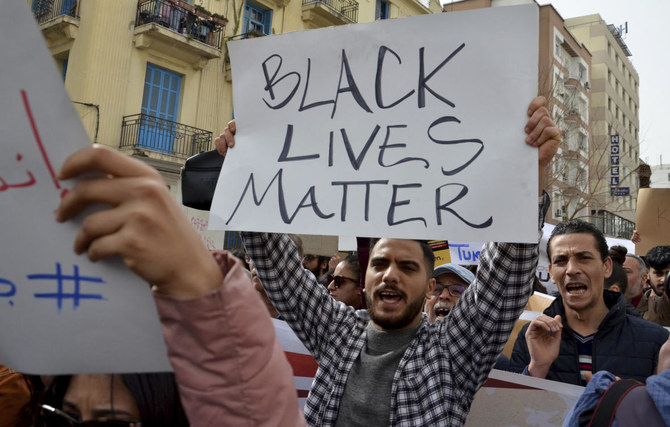
- Saadia Mosbah, who is Black, was taken into custody and her home was searched
- She was arrested after she posted on social media condemning the racism she faced
TUNIS, Tunisia: An anti-discrimination activist in Tunisia was arrested in a money laundering investigation this week as the dangerous and dire conditions facing migrants and their advocates worsen.
Saadia Mosbah, who is Black, was taken into custody and her home was searched as part of an investigation into the funding for the Mnemty association she runs.
She was arrested after she posted on social media condemning the racism she faced for her work from people accusing her of helping sub-Saharan African migrants, said Bassem Trifi, the president of the Tunisian League for the Defense of Human Rights.
Her arrest was the latest reflection of the problems facing migrants in Tunisia as authorities bolster efforts to police the shoreline where many embark on boats hoping to reach Europe.
In a national security council meeting focused on irregular migration, Tunisian President Kais Saied said Tuesday that associations that receive substantial foreign funds were “traitors and agents” and shouldn’t supplant the state’s role in managing migration and fighting human trafficking.
Fewer migrants have made the dangerous journey across the Mediterranean Sea this year due to weather and beefed-up border security. But human rights groups caution that efforts to curb crossings haven’t protected the tens of thousands of migrants stuck in Tunisia.
More than 80 migrants were arrested in Tunis last week after clashes with law enforcement as they cleared encampments in the capital that were “disturbing the peace,” according to Tunisia’s Radio Mosaique.
Hundreds of migrants had camped near the headquarters of the UN refugee agency and International Organization for Migration, often demanding the agencies repatriate them outside of Tunisia. Law enforcement used heavy machinery to raze their tents and then bused them outside of the city to “an unknown destination,” said Romdhane Ben Amor, a spokesman for the Tunisian Forum for Economic and Social Rights.
“Tunisia is deepening the crisis and promoting the idea that there is no solution,” Ben Amor told Radio Mosaique.
An estimated 244 migrants — most of them from outside Tunisia — have died or disappeared along the country’s Mediterranean coastline this year, including 24 whose bodies were found last week, the NGO said.
In a report based on government data released Monday, it noted that the number of migrants without papers boating across the Mediterranean had decreased as Tunisian authorities report an increasing number of interceptions. Such is the case for both migrants from Tunisia and migrants passing through the country en route to Europe.
In April, authorities directly thwarted 209 migration attempts and in total prevented more than 8,200 migrants from reaching Italy, the majority from sub-Saharan African countries. Tunisian Coast Guard have prevented more than 21,000 migrants from reaching Italy this year.
Managing migration to prevent scenes of chaos and despair along Italian shorelines has been a top priority for European leaders, including Italian Premier Giorgia Meloni, who has visited Tunis four times this year.
North African and European officials have sought to curb human trafficking and better police borders and coastlines to prevent deaths at sea. However, thousands of migrants fleeing conflict, poverty, persecution or hoping for a better life have continued to make the journey. They take boats from the coast north of Sfax, Tunisia’s second-largest city, to Italian islands such as Lampedusa, about 130 kilometers (81 miles) away.
The European Union hopes to limit migration with policies including development assistance, voluntary return and repatriation for migrants and forging closer ties with neighboring governments that police their borders. They have pledged billions of dollars over the past year to countries including Tunisia, Mauritania and Egypt to provide general government aid, migrant services and border patrols.
Though European leaders have hailed a $1.1 billion agreement with Tunisia as a template, Saied has pledged not to allow the country to become a “border guard” for Europe.
Less than one-third as many migrants have reached Italy in 2024 as had at this point last year, according to May 8 figures from Italy’s Interior Ministry. The UN refugee agency reported that more than 24,000 migrants traveled from Tunisia to Italy in the first four months of 2023 while less than 8,000 had successfully made the journey over the same time period this year.
Yemen’s Houthis say they targeted ships in Gulf of Aden, Indian Ocean
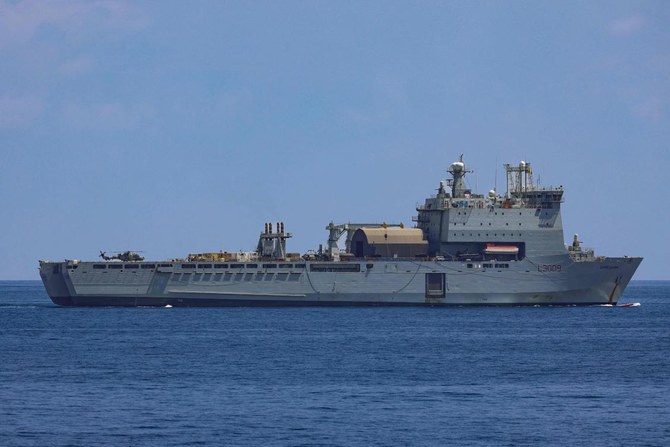
- The group also targeted the MSC VITTORIA in the Indian Ocean and again in the Gulf of Aden
DUBAI: Yemen’s Houthis on Thursday claimed two missile attacks in the Gulf of Aden on two Panama-flagged container ships that caused no damage, while also saying they targeted a ship in the Indian Ocean in a previously unreported assault.
The claims by Brig. Gen. Yahya Saree come as the tempo of the militia attacks have waned in recent weeks as they’ve been targeted by repeated airstrikes launched by a US-led coalition warship in waterways crucial to international trade. The Houthis insist their assaults will continue as long as Israel’s war on Hamas in the Gaza Strip goes on.
Saree in a prerecorded statement claimed attacks on the MSC Diego and MSC Gina. The Joint Maritime Information Center, a US-led coalition of nations operating in the Mideast, said those two missile attacks happened early Tuesday.
“Neither were hit and all crew on board are safe,” the center said. “The vessels were last reported proceeding to next port of call.”
The center added that the vessels were “likely targeted due to perceived Israeli affiliation.”
Both vessels were operating for Geneva-based Mediterranean Shipping Co., which did not immediately respond to a request for comment.
Saree did not say why it took the militia two day to claim the attacks. He also claimed the Houthis targeted the MSC Vittoria, another container ship, in the Indian Ocean. An attack on that vessel, however, has not been acknowledged by any authorities.
The Houthis say their attacks on shipping in the Red Sea and Gulf of Aden are aimed at pressuring Israel to end its war against Hamas in Gaza, which has killed more than 34,000 Palestinians there. The war began after Hamas-led militants attacked Israel on Oct. 7, killing 1,200 people and taking some 250 others hostage.
The Houthis have launched more than 50 attacks on shipping, seized one vessel and sunk another since November, according to the US Maritime Administration. Shipping through the Red Sea and Gulf of Aden has declined because of the threat.
Monitor, Iraqi group say Israel hits facilities in Syria
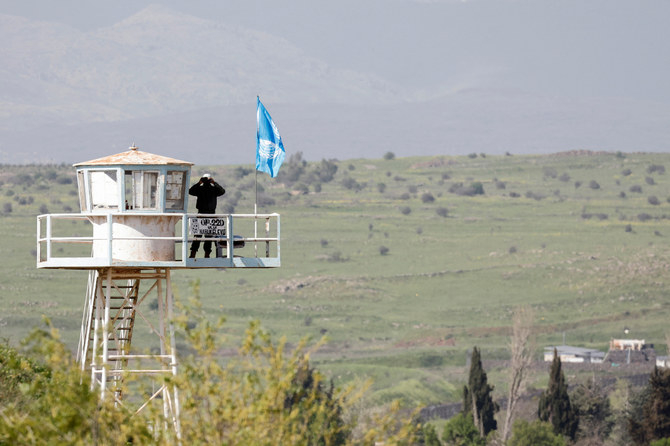
- The Syrian Observatory for Human Rights said “Israeli air strikes targeted a cultural center” and a “training facility” of the Iraqi Al-Nujaba movement
- Three members of the Iraqi group were wounded
BEIRUT: Israeli strikes on Syria early Thursday targeted facilities belonging to Iraq’s Al-Nujaba armed movement, a war monitor and the pro-Iran group said, with Damascus saying an unidentified building was attacked.
Israel has carried out hundreds of strikes in Syria since the outbreak of the civil war in its northern neighbor in 2011, mainly against army positions and Iran-backed fighters.
But the strikes increased after Israel’s war with Hamas in the Gaza Strip began on October 7, when the Iran-backed Palestinian militant group launched an unprecedented assault on Israel.
The Syrian Observatory for Human Rights said “Israeli air strikes targeted a cultural center” and a “training facility” of the Iraqi Al-Nujaba movement in the Sayyida Zeinab area south of Damascus.
Three members of the group were wounded according to the Britain-based Observatory, which relies on a network of sources inside Syria.
A source within the Iraqi faction, requesting anonymity as they were not authorized to speak to the media, confirmed that a “cultural center” belonging to the group was destroyed in the “Israeli” attack, but reported no casualties.
Al-Nujaba does “not have a declared military base in Syria,” the source added.
Syria’s defense ministry said that “at around 3:20 am today, the Israeli enemy launched an air attack from the direction of the occupied Syria Golan Heights targeting a building in the Damascus countryside.”
The attack caused “some material damage,” said the statement carried by state media, adding that air defense systems shot down some of the missiles.
The Sayyida Zeinab area is home to an important Shiite Muslim shrine that is protected by pro-Iran groups, including Lebanon’s Hezbollah, alongside the Syrian army, according to the Observatory.
The Al-Nujaba movement is part of a pro-Iran alliance in Iraq that Washington has blamed for numerous attacks on its forces.
Israel rarely comments on individual strikes on Syria, but has repeatedly said it will not allow its arch-enemy Iran to expand its presence there.
An April 1 raid blamed on Israel levelled Tehran’s consulate in Damascus and killed seven Iranian Revolutionary Guards, two of them generals.
That strike prompted Iran to launch a first-ever direct missile and drone attack against Israel on April 13-14 that sent regional tensions spiralling.



